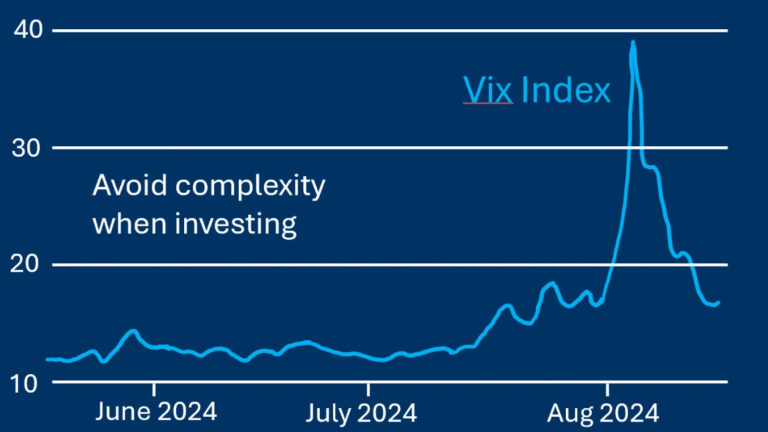The Fear Index (aka Vix Index) surged last week to the highest level since the Covid panic in March 2020. It hit 55 at one stage.

The Vix Index (Fear Index) measures the price that investors will pay for protection against falls in their portfolios. US stock market investors were suffering a short-lived panic and they were prepared to pay a lot for protection against their portfolios falling substantially in value.
Put options place a floor under the value that an investors\’ stock holdings can fall to. The Vix is an index of the price of put options (and call options) on S&P500 stocks. Hence it is an index of the price of protecting a portfolio against falls.
Investment banks are in the business of buying protection against stock price falls and selling that protection, at a big mark-up, to other investors. Nothing wrong with that – they are dealers after all.
But sometimes they are sneaky in how they buy the protection.
One way is through an investment product called an equity-linked note. These notes usually have a maturity of 12 or 24 months and pay high coupon rates (interest rates). They can pay high coupons because the note is linked to the price of an underlying share (say Tesla shares or Nvidia shares) or a basket of shares.
If the shares fall in price by a particular amount, say 15%, then the shares are handed to the investor to replace the bond. That is, the investment bank that sells the equity-linked note can put the referenced shares to the investor in exchange for the note. The investor suffers the loss of the share price fall.
The equity-linked notes bundle together the purchase of the note by the investor with the selling of protection by the investor. The investment bank unbundles the two after selling the note to the investor and sells the protection to another investor at a big markup.
The reason that this is sometimes a dubious process is that the investors don’t understand that they are selling protection at a low price. That is, investors unwittingly take on risk without receiving adequate compensation.
Most wealthy families who invest in these notes can’t see through the complexity of the notes and some investment banks take advantage of that to hide risk and fees in the notes
Some of my clients told me last week that their brokers were pushing these products out to them (as soon as the panic started and protection became valuable).
Don’t get sucked in by this. In fact, don’t invest in anything that you don’t understand completely regardless of what brokers or advisers say.
Simple lesson: Complexity is not your friend in investing.
Incidentally, the mighty Dan Galai was one of the co-inventors of the Vix Index in the 1980s, when he was a professor at the University of Chicago. He visited the Melbourne Business School every year for several years. Dan is a great guy.
Copyright August 2024 Sam Wylie
